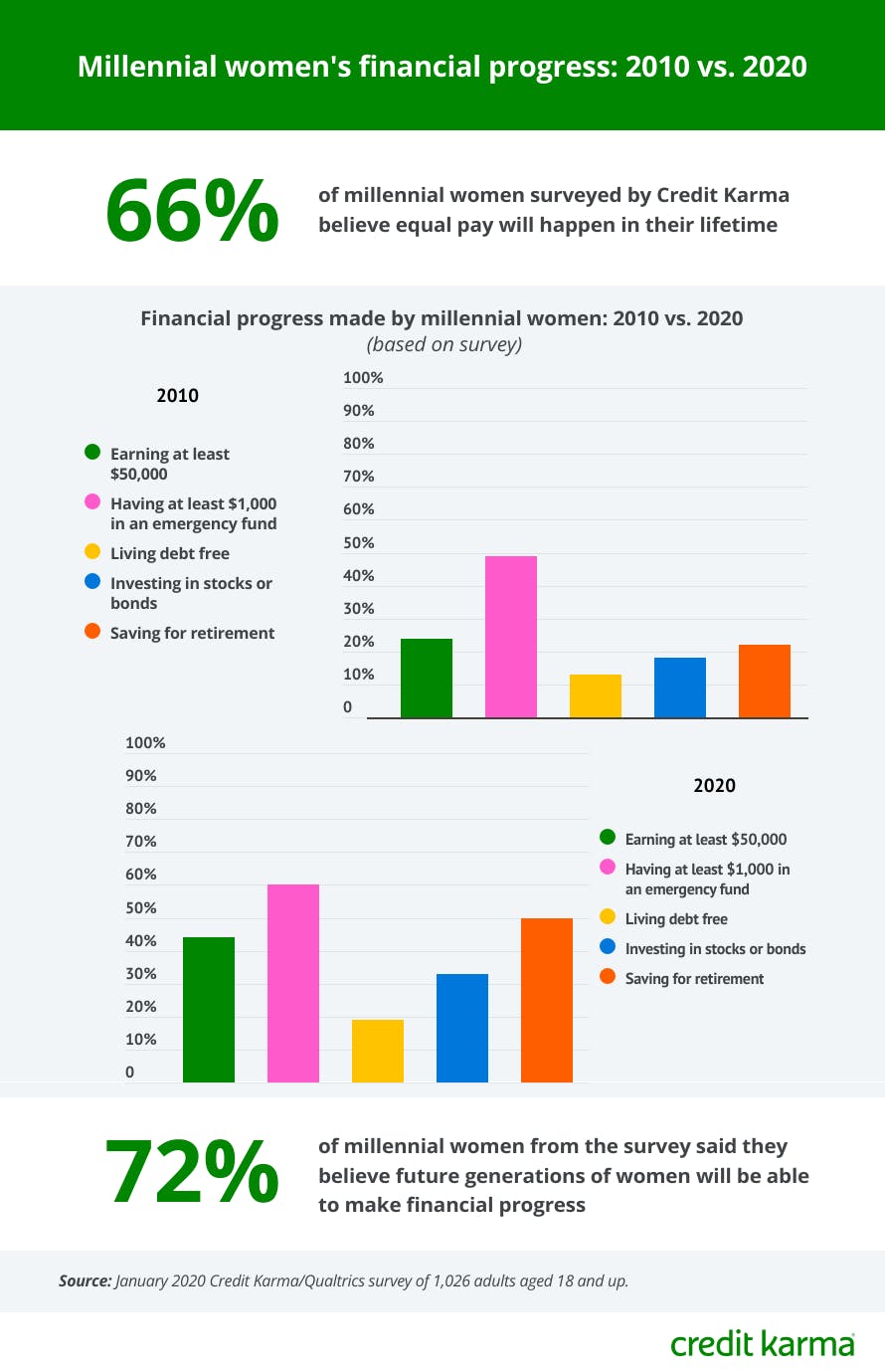In a Nutshell
Credit Karma surveyed women about the financial progress they made over the last decade. They find a lot to celebrate, but there is also room for improvement. Learn what money moves women have made over the past decade, and what they think is in store for future generations of women.It’s a new decade — and women are feeling optimistic about equal pay, their finances and future generations’ financial progress.
Those are the key takeaways from a Credit Karma survey about the financial progress women have made since 2010. About half of the women surveyed said they had felt optimistic a decade ago that equal pay would happen in their lifetime. Today, almost two-thirds feel optimistic.
And when it comes to the future, women are even more optimistic. Nearly three-fourths of survey respondents believe that future generations of women will be able to make financial progress. (Learn more about our methodology.)
This optimism for future generations may be driven by the progress the women we surveyed have seen in their own finances over the past decade. More than half say they are financially better off than they were in 2010.
Still, there’s work to be done. More women report feeling stressed out about their finances today than they felt 10 years ago. Here at Credit Karma, we believe in financial progress for all. So, we’ve got some tips below to help you feel more empowered to tackle financial stress and accomplish your goals.
Key survey findings
| Over the past decade, women have become more confident that workers, regardless of gender, will be guaranteed equal pay for equal work in their lifetimes (61% say they’re very to somewhat confident now vs. 52% in 2010). |
| Nearly three-quarters of women (72%) are somewhat or strongly optimistic that future generations of women can make financial progress. |
| Over half of women (53%) say they are financially better off now than they were a decade ago. |
| Still, there’s room for improvement. Women are more stressed about personal finance today than they were 10 years ago (54% say they’re somewhat or very stressed about finances today vs. 45% in 2010). |
What financial progress have women made over the past decade?
Many women we surveyed say they’re now doing much better financially than they were a decade ago. Just over half (53%) say they are better off than they were 10 years ago. Their salaries increased in nominal terms, women from the survey said, while more are debt free.
Millennial women in particular have been making significant money moves over the past decade. Here are some key areas where they said they’ve seen progress.
- Salary: 44% of millennial women from our survey make $50,000 or more in 2020, up from 24% in 2010. Note that to keep up with inflation, a person earning $50,000 in 2010 would need to earn $59,526 in 2020 to maintain the same buying power.
- Savings: 49% of millennial women from our survey who had an emergency fund in 2010 had more than $1,000 saved in it; in 2020, 60% of millennial women with an emergency fund have more than $1,000 in the account.
- Debt: Almost 1 in 5 (19%) millennial women from our survey are now debt free, compared to 13% in 2010.
- Investments: Very few of the millennial women we surveyed were investing money in 2010 (16%), but that number is up to one-third (33%) today.
- Retirement: Most millennial women from our survey (78%) weren’t saving for retirement in 2010, but today half are.
In addition, today only 18% of millennial women feel as if they’re paid less than others in a similar role, down from 40% in our survey who said they felt that way in 2010.
See our infographic about millennial women’s financial progress over the last decade.
How do women feel about future financial progress?
The progress women have seen in the past decade with their own finances may be giving many hope for the future. Today, nearly two-thirds of women believe that equal pay will happen in their lifetime, up from about half who said they had felt that way 10 years ago, according to our survey.
When it comes to individual financial progress, today 72% of women believe that future generations of women will be able to make financial progress.
This optimism may be explained, in part, by the growing availability of financial education resources over the last decade. When surveyed, nearly half of female respondents (48%) said they believe there are more or “much more” financial education resources to turn to in 2020 than 10 years ago.
Where the financial progress gap still exists
Despite all the positives that survey respondents have seen over the past decade — and the optimism they said they feel about the future — many see room to make even more financial progress, particularly in a few key areas.
- More women are stressed about their finances. A majority of women (54%) we surveyed said they’re stressed out about their finances today, up from just 45% who said they had felt stressed about their finances a decade ago.
- Many women are still working toward financial stability, while men are saving. When asked what their biggest financial goal was, 48% of female respondents put financial security at the top of the list. This is the same percentage who said stability had been their top financial goal a decade ago. By comparison, the most common financial goal that men we surveyed have in 2020 is saving for retirement (46%), while their top goal 10 years ago had been becoming financially stable (53%).
- Men still outpace women when it comes to earnings. Men’s overall income is still outpacing women’s: Today, 59% of the men have a personal annual income of $50,000 or more, compared to just 40% of the women we surveyed.
- Many women aren’t saving for the future. Everyone should be able to enjoy retirement in their golden years. But almost two-thirds (60%) of all women we surveyed said they’re not saving for retirement. By comparison, only 39% of men surveyed said they weren’t saving for retirement.
Tips for building financial confidence to make progress
We know from a previous survey we conducted that women in particular can feel discouraged when it comes to finances. But we’ve got some tips to help based on themes that emerged when we asked people in our most recent survey about the biggest piece of financial advice they would have given themselves in 2010.
- Save early, often and for the long haul. It’s OK to save money in small chunks, even something like $5 a paycheck. The important thing is to get started — and to continue. That’s because compound interest will work to your advantage by growing the interest you earn on your savings on top of the principal. With a high-yield savings account, you may be able to earn a higher interest rate than a traditional savings account.
- Prioritize debt payments. Although 18% of women surveyed report being debt free, the burden of debt weighs on many. Credit card debt is the most common type of debt among the 82% of female respondents who aren’t debt free. A debt repayment calculator can help you get an idea of how costly it could be to avoid paying down what you owe. If you’re unable to pay your credit card debt off right away, you may want to consider the pros and cons of taking out a debt consolidation loan with a lower rate.
- Advocate for yourself at work. Negotiating salary can be scary. But having information on pay can help. You can check out the Economic Policy Institute’s gender pay gap calculator or view salary information on sites like Glassdoor. You may also want to consider investing in a compensation report through 81cents. The U.S. Equal Employment Opportunity Commission’s website has more information about fair compensation in the workplace.
Methodology
On behalf of Credit Karma, Qualtrics conducted a nationally representative online survey in January 2020 of 1,026 U.S. adults to better understand how their finances have changed over the past decade and their views on equal pay.
 Image: djiwd
Image: djiwd

